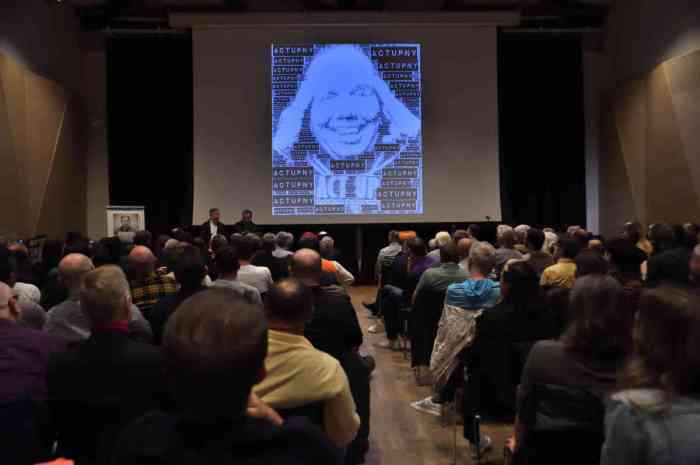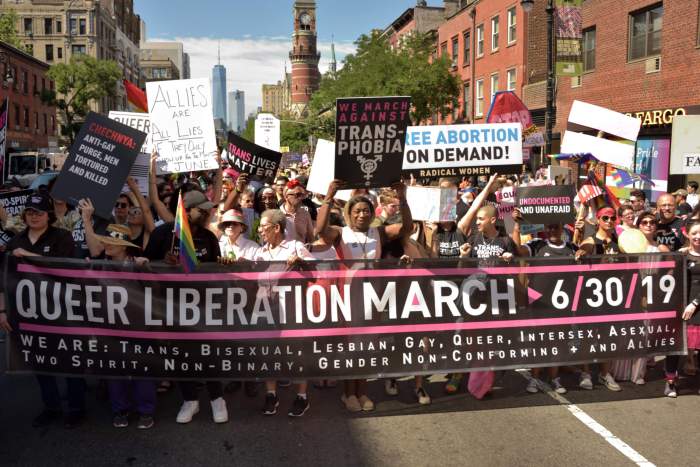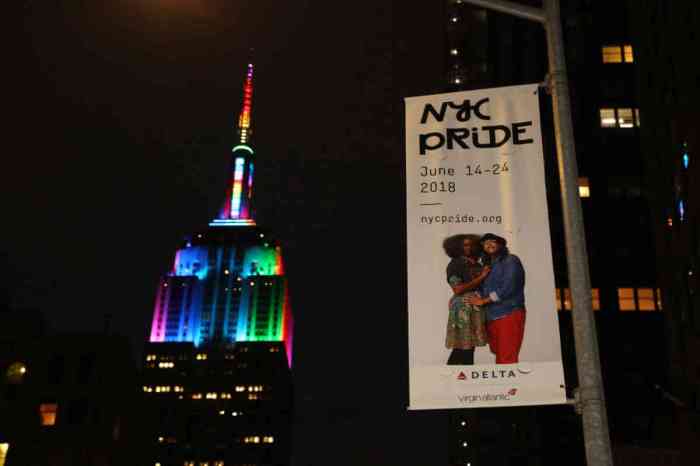Assemblyman Daniel O’Donnell. | DONNA ACETO
Members of Queer Nation, which has led the charge among New Yorkers pressuring Russia to repeal its notorious anti-gay laws, are calling on city and state officials to pull their investments in Russia as bad both morally and financially. While they are turning up the heat, along with Assemblyman Daniel O’Donnell and State Senator Brad Hoylman, both gay Manhattan Democrats, the city and state comptrollers are not ready for divestment.
Lame duck Mayor Michael Bloomberg, meanwhile, has made the city one of three sponsors of a November 18 forum promoting investment in Russia and vice versa.
[Editor's note: After this story was published and posted online, Michael Best, a counselor to the mayor, wrote in an email to gay activist Bert Leatherman, who complained about the city's sponsorship of the November 18 forum promoting investment in Russia, “The New York City Office of the Mayor is not a sponsor of this event, and we are asking the event's coordinators to remove from their website the statement that the Office of the Mayor is a sponsor of the event.” Bloomberg, however, did write a letter of welcome to the event organizers. Gay City News has made several requests for information about what the city is doing to combat the ant-gay laws in Russia.]
In response to O’Donnell’s call for divestment, New York State Comptroller Tom DiNapoli’s press secretary, Eric Sumberg, told Gay City News his office is “engaging with worldwide Olympic sponsors to encourage them to make their position clear on opposition to the Russian laws and to make a commitment to all freedoms of speech and assembly.”
Two Manhattan lawmakers on board but city, state officials not there yet
That didn’t cut it for Duncan Osborne of Queer Nation (full disclosure: who is Gay City News contributor), who said, “He should be encouraging them to walk away from the Olympics [in Sochi, Russia in February]. As an investor, state pension funds manage billions and the comptroller is in a position to bring pressure to bear on these sponsors. With the [American] companies operating in Russia that have pro-LGBT policies, he could be doing shareholder resolutions to adopt these policies in Russia” as well as publicize them in Russian.
In a September 10 letter to O’Donnell, DiNapoli wrote that he is “deeply troubled by the anti-gay crackdown that is being led by President Putin.” But, he wrote, “I am prohibited from subordinating the economic interests of the [NYS Common Retirement] Fund to other objectives, no matter how compelling.” He went on to describe divestment as requiring a “costly, complex, and time-consuming process.” He did pledge to address the concerns “through careful monitoring and engagement, where appropriate, by the Fund’s Bureau of Corporate Governance of the portfolio companies that may be connected with the Russian government or doing business in Russia to assure that they are not in some way — knowingly or unknowingly — enabling that nation’s leadership in its egregious practices and potentially harming company value and reputation.”
Assemblyman O'Donnell reacted to DiNapoli's move this week, saying, “I understand the fiduciary responsibility of the state comptroller. I respect Tom, but I want them to take action on behalf of the people of New York so that it is clear that [the Russian anti-gay crackdown] is not acceptable. My communications with them leave me confident that in the coming weeks their action will be strong and clearly aligned with protecting the rights of gay people throughout the world.”
Osborne explained that the divestment movement is in the early stages. “No one is asking Tom DiNapoli to create a movement to divest in Russia,” he said. “We are asking him to use the tools he has to get rid of toxic Russian assets.” Osborne has made a freedom of information law (FOIL) request of the city and state comptrollers to reveal their Russian investments, which Sumberg acknowledges the state has. But Sumberg referred the newspaper to the comptroller’s website, which publicly lists all investments, rather than provide a breakdown.
“The city and state should not be investing in Russia, for moral and economic reasons,” Osborne said. “It is not a place where there is rule of law. We should not be putting money at risk or supporting in any way their government, which is cracking down on LGBT Russians, ethnic minorities, political dissidents, and others.”
Osborne also cited the political corruption in Russia. “With Putin consolidating political and economic power, those assets are at risk,” he said.
A spokesperson for City Comptroller John Liu told Gay City that his office will “monitor developments” in Russia “consistent with our responsibility to city workers and retirees.” That office would not comment further on the crisis in Russia, but disclosed that police, fire, and Board of Education pension holdings in Russia are valued at just over $104 million.
About 25 activists demonstrated outside the Princeton Club on October 28 at an action by Queer Nation against a daylong conference called “Invest in Moscow” led by the Moscow City Government and Business Community. Four members of Queer Nation signed up for the forum, and as the first panel began they started asking questions. Osborne raised the issue of the lack of “rule of law” in Russia. Mark Milano said he asked them, “How can you think of investing with people actively oppressing gay people?”
Milano said that Sergei Cheremin, a Moscow government minister and head of the Department for Foreign and International Relations, “began laughing” at that point. “Someone shouted, ‘Gays will be the death of Russia!,’” Milano said, “and I said, ‘You should all be ashamed of yourselves.’”
Osborne and Milano were led from the room along with activists Scott Wooledge and John Weir (no relation to the gay skater of the same name who is married to a Russian man and will be doing commentary for NBC at Sochi).
Outside the Princeton Club, three huge banners made by Gilbert Baker, father of the Rainbow Flag, were unfurled: “SUPPORT RUSSIAN GAYS,” “DON’T BUY PUTIN’S LIES,” and a tiger-striped one appropriate for the Princeton Club reading “PUSSY POWER” in reference to the persecution of the women’s band Pussy Riot in Moscow.
Queer Nation’s Ann Northrop held a sign reading “Russia = Fascist State” and “Putin has blood on his hands.” “I’m asking US businesses not to do business in Russia,” she said, “because all they’re doing is supporting the human rights violations of this Putin government and it is shameful to put greed over human rights.”
Most of those attending the forum rushed inside, refusing to comment on the demonstration or the issue. But several came back out to grab some smokes.
Svetlana Batrak of the Russian Center New York, a sponsoring organization of the forum, criticized the demonstrators, saying Americans “should first and foremost pay attention to the enormous social issues here,” citing youth homelessness in New York. She said the demonstrators “are trying to dictate to an independent, sovereign country” and that the new laws against gay expression are “completely supported by the citizens” of Russia. Indeed, 85 percent of Russians polled support the laws that were passed without dissent earlier this year by the Russian parliament.
Batrak denied that the new laws target any minority in Russia. “No one limits rights,” she said, also dismissing reports of murders of gays that the police won’t investigate. “Many people are murdered on the streets,” she said, insisting it was not a disproportionate number of LGBT people.
Queer Nation’s recent Metropolitan Opera action against conductor Valery Gergiev, a Putin pal, was “not pretty,” she said, insisting that the LGBT community must show respect for the “diversity of cultures.”
Surprisingly, Batrak’s LinkedIn page says she has worked at the AIDS Healthcare Foundation and at the Open Society Foundations, a grant-making group founded by the wealthy progressive philanthropist George Soros.
The Russian Center New York is also sponsoring the November 18 investment forum with the City of New York and Goodwin Procter LLP, at whose offices, in the New York Times building at 41st Street and Eighth Avenue, it will be held.
Bloomberg’s press office has repeatedly dodged questions about the crisis for LGBT people in Russia and what the city will do to address it. The mayor did, however, write a letter promoting the November 18 forum, saying “it is an excellent opportunity to examine the state of U.S.-Russia relations, and to discuss how business leaders from both countries can best work together for the benefit of our common interests.”
City Council Speaker Christine Quinn’s office also did not respond to an emailed request for comment.
The keynote speaker at the November forum is James Silkenat, president of the American Bar Association whose office said he was traveling and unavailable for comment on why he was taking a role in a conference promoting investment in Russia.
Goodwin Procter did not respond to email and phone messages seeking comment.
Yelena Goltsman, founder and co-president of RUSA LGBT, a Russian-speaking American LGBT group, said at the Princeton Club action that divestment “is one the major things we can do. It’s great to dump vodka and other things, but divestment is going to really hurt and is going to make Putin and his cronies cringe and possibly make better decisions as far as human rights concerns.”



































